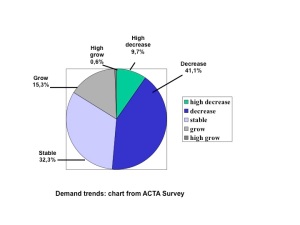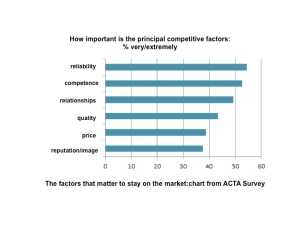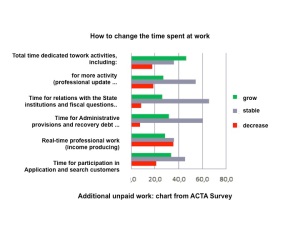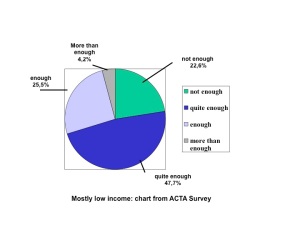di Giovanipaolo Ferrari
Nonetheless the attempts of private agencies (IWA/HWG 2014) to classify the professions of the Web, the process of professionalization of these biographic professional directions (Dubar 1998, 2010; Demaziere & al. 1999, 2001) is everyday more complex and not easy to standardize in categories.
Social Media Manager (SMM) is one of the most required professional profiles. Companies need professionals as SMM to manage contents and interactions on social media and virtual communities, but they also need someone who generates social media contents adapted to commercial targets of different companies.
In the last ten years mass media corporations (MMC) reorganized their business around digital market and they developed new strategies to be more competitive (Castells 2008). MMC start to offer several web services to users: Technical support, customer service, multimedia contents, etc.
However, the rise of social media changed even more the way of broadcasting in mass-media communication (Lovink 2012; Morozov 2011; Carr 2011; Castells 2008). The worldwide pervasiveness of social media forced MMC to invest economic and human resources to social media team in order to open and manage a dedicated forum, official profiles and pages on different and several platforms. All that brought a change also in professional practices where companies had to adapt their communication one-to-many to one-to-one and many-to-many communication (Castells 2008).
Also national and commercial radio networks changed their working practices and they started to need additional professional profiles in their organization chart (Bonini 2006, 2014; Brochard 2006; Colombo, 2007; Diana et al. 2012; Menduni 2012). For fifteen years radio evolved and some different professional figures appear in the radio context. Indeed, radio need someone that tries to manage all accounts and contents of social media (Bonini 2006; Zanchini 2011; Stockment 2009). For beginning the main problem, was just manage their profiles: Open, manage separate accounts on Facebook, twitter, forum and try to answer sometimes or just manage this account like a blog or like a website. They were interested in social media just to give and take information about customers; but after that they understood that social media is not a one-way communication media (one-to-many), but it is « social ». Social media communication is a continuous interaction with customers, users, auditors, so relationships between radio networks and auditors/users changed completely. They build together communities of practice (Wenger 1998; Wenger et al. 2002). Nevertheless, what happened after this change? It happened that public and private radio started to income some additional professional profiles like the SMM.
This paper shows the professional profile of SMM in national and private radio networks in Italy and France and tries to answer to these questions: What is SMM in a radio network? What kind of educational background SMM needs to have? What are SMM professional practices? What skills this professional figures must have and how this figure interacts with others in the radio context?
We collected several SMM profiles on professional social media (LinkedIn and Viadeo) and job seeker advices. We observed, moreover, interactions between SMM and users of four virtual radio communities: two public (Radio France and Radio RAI) and two commercial (Virgin Radio France and Virgin Radio Italy). The observation shows different ways and different styles to manage social media radio communities. We observed micro-interactions and situated actions (Hughes 1958; 1963; 1971; Suchman 1987; Gherardi 2007; Barley 1996; 2001) to bring out situated professional practices. Researchers need to go on the field to study these professional phenomena and observe practices in all single virtual workplaces. The latter, in our case, is social media communities and the action is situated on the screen, on the interface (Wenger et al. 2002; Gherardi 2007; Demaziere 2011).
Nowadays, also national radio with a celebrated history as Radio France or Radio RAI needs to integrate in their organization chart these figures that are Web professional profiles and they are not part of radio broadcasting tradition. They are also required to open their world with the integration of Web professionals. The SMM is a very important role in a radio network to include social media in broadcasting platforms. In the last ten years, the skills of SMM changed: the « classical » profile of SMM was linked to an idea of professionals close to the marketing and communication sector (Holmes 2013; Claveria 2014). Instead, the market requires other skills from a SMM. Analysis of job seeker advises, for instance, support the idea that radio networks require not just technical skills, but grammar, orthography and educational skills. The point of view is about change, is about being displaced in another field: the field of contents and continuous interactions with users. A SMM in a radio network needs to have extensive skills from his background. In Radio France or Radio RAI, recruiters ask a broad musical culture and pedagogical skills. The SMM has to do more than a technical support or customer service manager. The analysis depicts a different frame between community strategies and practices of public and commercial radio networks. The Facebook profiles, indeed, are completely different between them: the contents published, but also the style of communication, the grammar structure of sentences, the interactions structure (question/answer) and the timing of intervention in the discussion. Therefore, the analysis of interactions shows that is difficult for SMM with a work experience in Virgin Radio France or Italy, to be recruited in Radio France or Radio RAI. The SMM is supposed to talk about products not just with passion or competences, but also with specifically mind-set identity. In this perspective, the SMM cannot exist as a stable and defined professional profile and technical skills are just a small and peripheral component of SMM professional profile.
To conclude, in the age of the Internet maturity there is no place for beginners also if they have appropriate informatics skills. It is finished the Internet of nerds and geeks and it is started the Internet with « everyone ». The latter would be less an impoverishment of the Web, rather than an enrichment of a process of professionalization of web professions (Bureau et al. 2006) with additional competences: Everyday more connected with humanities rather than informatics. It emerged, from the analysis, that cultural and technical skills are not the same: the SMM is not anymore just a « technical technician » (a community expert with some informatics skills) (Barley 1996), but he must be a « humanist » too, namely an expert in contents, with a humanist sensitivity. Currently, the rise of semantic web and simplification of programming languages, thanks to evermore friendly interfaces (Gane et al. 2008), is changing the Web in a « content and interactive universe ». In this context, a SMM must be able to master concepts and ideas, to manage and generate the contents and not just to administrate accounts and solve technical matters. It seems a job more adapt to a philosopher than to a developer of HTML5 or CSS. For these reasons, it is not feasible to put all these various professionals under the same category.
References
Barley, S. R. (1996). Technicians in the workplace: Ethnographic evidence for bringing work into organizational studies. Administrative Science Quarterly, 404-441.
Barley, S. R., & Kunda, G. (2001). Bringing work back in. Organization science,12(1), 76-95.
Benjamin, W., R. Grandi (1995). Il pensiero e la radio: cento anni di radio: una antologia di scritti classici, Lupetti & Company; Editori di comunicazione.
Bonini, T. (2013). La radio in Italia: storia, mercati, formati, pubblici, tecnologie. Carocci, Roma.
Bonini, T. (2006). La radio nella rete: storia, estetica, usi sociali, Costa & Nolan.
Brochand, C. (2006). Histoire générale de la radio et de la télévision en France: 1974-2000 (Vol. 3). la Documentation française.
Bruni, A., & Gherardi, S. (2007). Studiare le pratiche lavorative. icon, 39(051), 256011.
Bureau, S., & DeSanctis, G. (2006). A professionalization view: A framework for research on information technology and organizational form evolutions. The Case of Webmasters. In World Wide Web Conference, Intrawebs, Edimbourg, Ecosse.
Castells, M. (2013). Communication power. Oxford University Press.
Castells, M. (2011). The rise of the network society: The information age: Economy, society, and culture (Vol. 1). John Wiley & Sons.
De Biase F., Garbarini A. (2003). High tech high touch. Professioni culturali emergenti tra nuove tecnologie e relazioni sociali. Milano, Franco Angeli.
Demazière, D., & Dubar, C. (1999). L’entretien biographique comme outil de l’analyse sociologique. UTIVAM–Revue de Sociologie et d’Anthropologie, 1(2), 225-239.
Demazière, D., & Dubar, C. (2001). Parcours professionnels, marchés du travail et formes identitaires: une théorisation. Contribution to the 8th” Journées de sociologie du travail.
Demazière, D., Horn, F., & Zune, M. (2011). Ethnographie de terrain et relation d’enquête. Observer les «communautés» de logiciels libres. Sociologie, 2(2), 165-183.
Diana, P., Addeo, F. (2012). Italian University Webradio: a Training Ground for New Professions in Media (La Webradio D’Universités Italiennes: Un Atelier Pour De Nouvelles Figures Professionnelles). Available at SSRN 2012988.
Dubar C., Tripier P., Boussard V. (2011). Sociologie des professions. Paris, France, Armand Colin.
Dubar, C. (2010). La socialisation: construction des identités sociales et professionnelles. Armand Colin.
Dubar, C. (2004). Analyser les entretiens biographiques: l’exemple des récits d’insertion. [Québec]: Presses de l’Université Laval.
Dubar, C. (2001). La crise des identités: l’interprétation d’une mutation. Presses universitaires de France.
Dubar, C. (1998). Trajectoires sociales et formes identitaires. Clarifications conceptuelles et méthodologiques. Sociétés contemporaines, 29(1), 73-85.
Carr, N. G. (2011). Internet ci rende stupidi? Come la rete sta cambiando il nostro cervello, Raffaello Cortina Editore.
Cheval, J. J. (1997). Les radios en France: histoire, état et enjeux. Apogée.
Claveria, K. (2014). The social media manager is (almost) dead: 5 tips on how to evolve as a marketer. http://goo.gl/cHwLQk.
Colombo, F. (2007). La digitalizzazione dei media, Carocci, Roma, La rado digitale tra il web e il DAB di Carlo, S., Cap. V, pp. 105-123.
Florida, R. L. (2002). The rise of the creative class: and how it’s transforming work, leisure, community and everyday life. Basic books.
Gane, N., & Beer, D. (2008). New media: The key concepts. Berg.
Gherardi, S. (2000). Practice-based theorizing on learning and knowing in organizations. Organization, 7(2), 211-223.
Gherardi, S. (2009). Organizational knowledge: The texture of workplace learning. John Wiley & Sons.
Hendy, D., M. Perrotta (2002). La radio nell’era globale, Editori Riuniti.
Holmes, R. (2013), The Social Media Manager is Dead. Long Live Social Media. http://goo.gl/Ukddz1.
Hughes, E. C. (1958). Men and their work (Vol. 958). Glencoe, IL: Free Press.
Hughes, E. C. (1971). The sociological eye: Selected papers. Transaction publishers.
Hughes, E. C. (1963). Professions. Daedalus, 655-668.
IWA/HWG (2014), http://www.skillprofiles.eu/.
Legault, G. A. (2003). Crise d’identité professionnelle et professionnalisme (Vol. 9). PUQ.
Lovink, G. (2012). Ossessioni collettive: critica dei social media, Milano, EGEA. La radio dopo la radio: dalle radio pirata agli esperimenti su internet, pp.183-194.
Menduni, E. (2012). Il mondo della radio. Dal transistor ai social network, Il Mulino, Bologna, La radio digitale e il Web 2.5, Cap. XIV, pp. 223-245.
Monteleone, F. (2013). Storia della radio e della televisione in Italia: un secolo di costume, società e politica, Marsilio Editori.
Morozov, E. (2011). L’ingenuità della rete. Il lato oscuro della libertà di internet, Codice edizioni, Torino.
Nicolini, D., Gherardi, S., & Yanow, D. (Eds.). (2003). Knowing in organizations: A practice-based approach. ME Sharpe.
Pasquinelli, M. (2002). Media Activism. Strategie e pratiche della comunicazione indipendente. DeriveApprodi, Roma, Cap. 4, Radio-attività. Un medium in continua evoluzione, pp. 121-140.
Prandstraller, G. P. (2004). Il lavoro professionale e la civilizzazione del capitalismo: il capitalismo cognitivo americano e la sfida economica cinese (Vol. 163). Franco Angeli.
Schön, D. A. (2006). Il professionista riflessivo. Per una nuova prospettiva della formazione e dell’apprendimento nelle professioni. Milano, Franco Angeli.
Schön, D. A. (1993). Il professionista riflessivo. Per una nuova epistemologia della pratica professionale (Vol. 152). Bari, Edizioni Dedalo.
Stockment, A. (2009). Internet Radio: The Case for a Technology Neutral Royalty Standard. Virginia Law Review: 2129-2179.
Suchman, L. A. (1987). Plans and situated actions: the problem of human-machine communication. Cambridge university press.
Suchman, L. (2007). Human-machine reconfigurations: Plans and situated actions. Cambridge University Press.
Zanchini, G. (2011). Fare la radio nell’epoca dei social network. come i new media stanno cambiando un vecchio medium. Sociologia della comunicazione.
Wittorski R. (2009). À propos de la professionnalisation, in Barbier J-M et al., Encyclopédie de la formation, Paris, PUF, pp. 781-792.
Wenger, E. (1998). Communities of practice: Learning, meaning, and identity. Cambridge university press.
Wenger, E., McDermott, R. A., & Snyder, W. (2002). Cultivating communities of practice: A guide to managing knowledge. Harvard Business Press.




